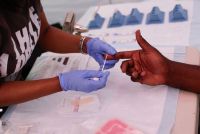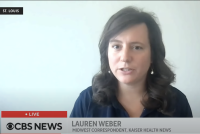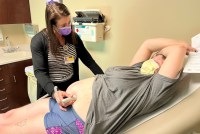Latest KFF Health News Stories
Post-‘Roe,’ People Are Seeking Permanent Sterilizations, and Some Are Being Turned Away
Doctors in states where abortion is or could be banned say more patients are seeking permanent sterilization procedures, but some patients are reporting that providers are unwilling to operate on people of childbearing age.
Ad Targeting Manchin and AARP Mischaracterizes Medicare Drug-Price Negotiations
The advocacy group American Commitment said empowering Medicare to negotiate drug prices would raid it of billions of dollars. Drug pricing experts say that that’s not the case and that such policies would instead reduce costs for the Medicare program and seniors.
A Nearly Century-Old Maternity Home for Teens in the South Makes Plans for Expansion
Homes for pregnant girls may seem like a vestige of the past. But they still exist and, in light of the Supreme Court’s recent ruling on abortion, may become more necessary.
Three Things About the Abortion Debate That Many People Get Wrong
The commonly repeated myths include arguments that only women who are pregnant are affected by the decision overturning Roe v. Wade, that Democratic lawmakers could have codified abortion protections before, and that Congress can easily get rid of federal laws restricting abortion.
KHN’s ‘What the Health?’: Drug Price Bill Is a Go in the Senate
Two things happened in Washington this week that were inevitable: President Joe Biden tested positive for covid-19, and the Senate agreed to move forward on a budget bill that includes only a sliver of what Biden hoped it would. Still, the bill to allow Medicare to negotiate some drug prices, cap out-of-pocket drug costs for seniors, and extend temporary subsidies for Affordable Care Act insurance premiums would represent a major step if Democrats can get it across the finish line. Meanwhile, abortion battles continue to escalate around the country, with Texas leading the way in restrictions. Shefali Luthra of The 19th, Joanne Kenen of the Johns Hopkins Bloomberg School of Public Health and Politico, and Rachel Cohrs of Stat join KHN’s Julie Rovner to discuss these issues and more. Also this week, Rovner interviews Dr. Jack Resneck Jr., the new president of the American Medical Association.
‘So Rudderless’: A Couple’s Quest for Autism Treatment for Their Son Hits Repeated Obstacles
Amparo and Victor Rios began searching for answers about their son’s development when he didn’t hit some milestones after turning 2. Three years later, they are still trying to get their insurance to pay for expensive therapy to help him.
Parents Become Drug Developers to Save Their Children’s Lives
Families affected by ultra-rare diseases are starting their own companies to speed the development of treatments for their kids, venturing into territory that traditional drugmakers deem too risky.
Critics Worry Government Surveillance of HIV May Hurt More Than It Helps
Some people living with HIV and some state health officials are raising concerns about part of the federal effort to end the HIV epidemic: a new technology that analyzes blood samples to find emerging outbreaks. The critics say it’s too invasive and stigmatizing and might not be more effective than older public health approaches.
Watch: Why the Public Health System Is Having Trouble Containing Monkeypox
KHN Midwest correspondent Lauren Weber appeared on CBS News’ streaming network to discuss “Fighting Monkeypox, Sexual Health Clinics Are Underfunded and Ill-Equipped,” an article she wrote with KHN senior correspondent Liz Szabo. It details how ill-equipped the nation’s sexual health clinics and public health system are to tackle monkeypox after decades of underfunding. Weber described […]
Fighting Monkeypox, Sexual Health Clinics Are Underfunded and Ill-Equipped
Sexual health clinics are scrambling to properly track, test, and treat hundreds of monkeypox patients. So far, it isn’t going well.
No-Bid Medicaid Contract for Kaiser Permanente Is Now California Law, but Key Details Are Missing
California Gov. Gavin Newsom signed a bill last month that authorizes a statewide Medicaid contract for HMO giant Kaiser Permanente. But details still need to be worked out in a memorandum of understanding.
In Some States, Voters Will Get to Decide the Future of Abortion Rights
Measures to enshrine the right to abortion in the state constitution will be on the ballot in California and Vermont this fall. Abortion-rights advocates in Michigan are hoping their state will follow suit.
FTC Official: Antitrust Push in Health Care Must Focus on a Merger’s ‘Human Impact’
Mark Seidman, an assistant director in the Federal Trade Commission’s Bureau of Competition, talks with KHN about efforts to police consolidation among hospitals and other health care providers.
Biden’s FTC Has Blocked 4 Hospital Mergers and Is Poised to Thwart More Consolidation Attempts
The president has directed the Federal Trade Commission to carefully consider health industry mergers that may stymie competition and drive up prices. The new Democratic majority appears eager to look beyond traditional hospital consolidations to deals that involve products, services, or staffing.
Conservative Blocs Unleash Litigation to Curb Public Health Powers
Spurred on by opposition to pandemic-related health mandates, a coalition of religious liberty groups, conservative think tanks, and Republican state attorneys general has filed a cascade of litigation seeking to rein in the powers of public health authorities.
Boost Now or Wait? Many Wonder How Best to Ride Out Covid’s Next Wave
As the country faces a rise in new infections driven by the omicron BA.5 subvariant of the coronavirus, about 70% of people 50 and older who got a first covid-19 booster shot haven’t received the recommended second one, according to the Centers for Disease Control and Prevention. Many undervaccinated Americans have lost interest, and others aren’t sure whether to get boosted again now or wait for vaccines reformulated to target newer strains of the virus.
Nurse Midwives Step Up to Provide Prenatal Care After Two Rural Hospitals Shutter Birthing Centers
Dozens of Iowa hospitals have closed their birthing units. A team of University of Iowa nurse midwives can’t reopen them, but they’ve found a way to provide prenatal checkups and other crucial services in two towns.
As Big Pharma Loses Interest in New Antibiotics, Infections Are Only Growing Stronger
Existing drugs still treat most infections. But that has discouraged investment in new drugs that will be needed when — not if —the old ones fail.
California’s Public Health Tax Is Dead for the Year
A ballot measure that would have taxed California millionaires to boost public health funding will not be on the November ballot. But the tech titans who bankrolled the effort say they are negotiating with Gov. Gavin Newsom’s administration to get more money without imposing new taxes.
Listen: Why Medical Debt Touches Every Corner of America
KHN senior correspondent Noam N. Levey joined WBEZ and Wisconsin Public Radio to talk about medical debt and health care costs in the U.S.


























